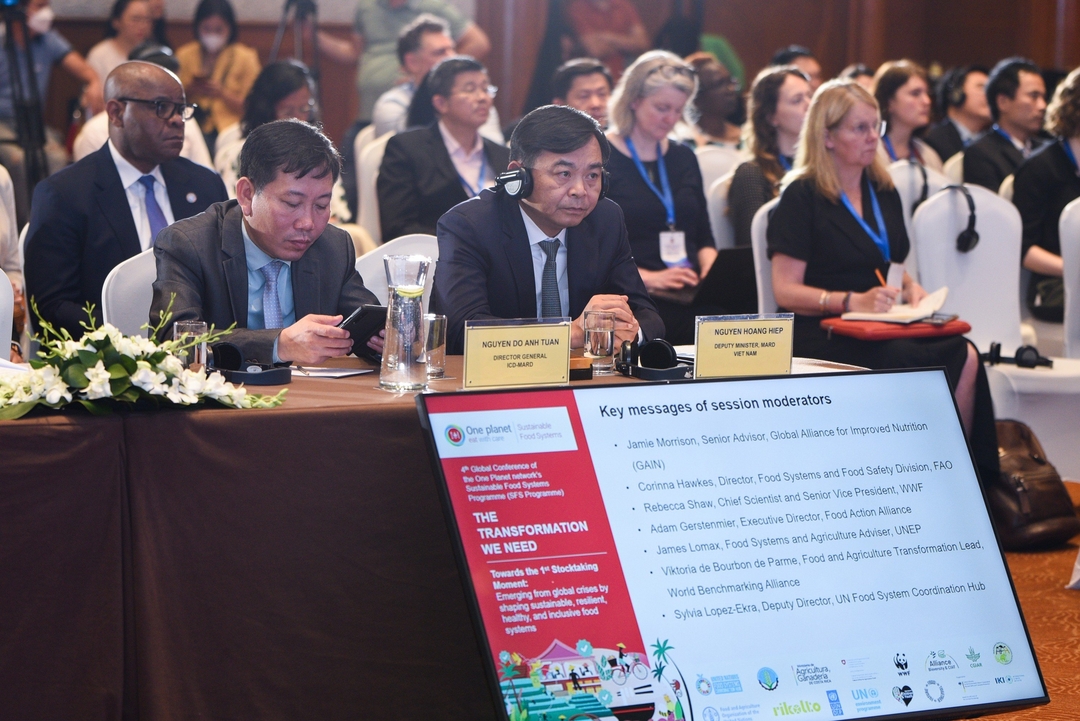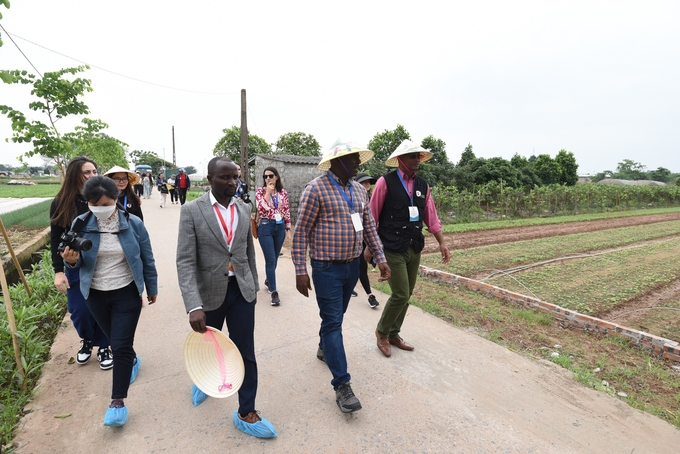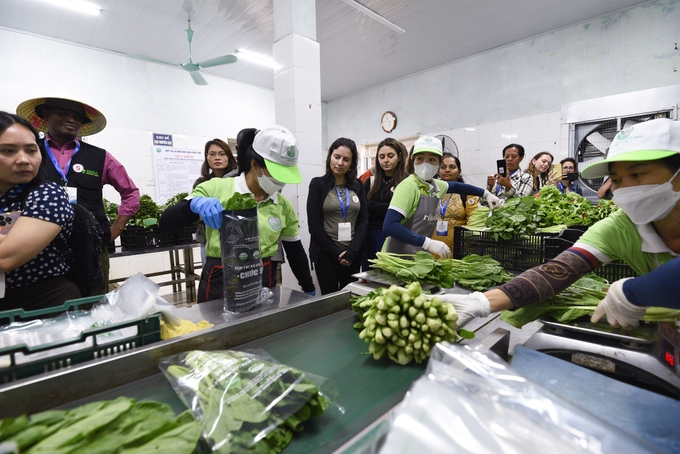November 24, 2025 | 01:08 GMT +7
November 24, 2025 | 01:08 GMT +7
Hotline: 0913.378.918
November 24, 2025 | 01:08 GMT +7
Hotline: 0913.378.918
After three and a half days of active and effective work, the fourth Global Conference of the One Planet Network’s Sustainable Food Systems Programme with the theme "THE TRANSFORMATION WE NEED: Emerging from global crises by shaping sustainable, resilient, healthy, and inclusive food systems" hosted by the Ministry of Agriculture and Rural Development in Hanoi, started its closing session on the morning of April 27.

The representative of the Swiss delegation making a speech at the closing session. Photo: Tung Dinh.
The role and position of Vietnam in the world are enhanced
Through the conference, Vietnam's prestige, role and position as a "transparent, responsible and sustainable food supplier", a responsible member for global issues including food and energy security, climate change, emerging pandemics are enhanced.
Mr. Christian Hoffer, Minister of Agriculture of Switzerland, assessed that Vietnam has a lot of experience and good models in transforming a transparent, responsible and sustainable food system. “Vietnam has shared a lot of experiences with delegates participating in the fourth Global Conference directly or online. Through the mass media, Vietnam makes an important contribution to the transformation of the global food system towards transparency, accountability and sustainability”.
Sharing the same view, Ms. Sylvia Lopez-Ekra, Deputy Director of the United Nations Food System Coordination Center commented: "Vietnam's models and practices have inspired the participating countries joining the conference this time".
Vietnam has turned verbal commitments into strong and specific actions from the central to local levels, aiming to effectively implement the “National Action Plan on Food Systems Transformation toward Transparency Responsibility and Sustainability by 2030”.

Deputy Minister of Agriculture and Rural Development Nguyen Hoang Hiep attended the closing session. Photo: Tung Dinh.
Not only pioneering the transformation of sustainable food system, Vietnam is also willing to share experiences and cooperate with other countries in developing agriculture and rural areas, ensuring food security, especially through the South-South cooperation program.
Three cooperation mechanisms proposed by the host country of the fourth Global Conference include:
I) Promote South-South cooperation to ensure food security and transform sustainable, inclusive and resilient food systems in developing countries;
II) Establish a food innovation network for Southeast Asia within the framework of the Vietnam Sustainable Agriculture Development Partnership to expand cooperation in research, policy making and promote the replication of green, environment-friendly, low-emission and sustainable models.
III) Strengthen cooperation with international partners, development stakeholders and countries to implement the “National Action Plan on Food Systems Transformation toward Transparency Responsibility and Sustainability by 2030”; share knowledge, experience, good practice models with other countries to jointly transform the sustainable food system.

Delegates went on field visits...

... as well as clean food production processes that are being applied more and more widely in Vietnam.
In addition to the series of exchange sessions throughout the conference, the participants were also introduced to good and typical models of the transformation of the food system through 5 field trips in Hanoi, Bac Ninh, and Thai Nguyen by the host country Vietnam. Appreciating the organization as well as the participation of stakeholders in the conference, a total of more than 300 participants agreed on the conference’s five key messages:
I) Food system transformation toward sustainability and resilience is a prerequisite for addressing crises related to food insecurity, malnutrition, health, climate change, biodiversity loss, conflict, as well as high consumption and energy prices.
II) Food system transformation requires a global approach. However, the choice of how to transform the food system should take into account the specific context of each country and localities of that country.
III) Food system transformation needs to be associated with relevant factors including climate change, biodiversity, trade, and at the same time utilize an inclusive, multi-sectoral, multi-sectoral and holistic approach system.
IV) Food system transformation at the national level requires sufficient political will and the participation and coordination of all sectors and fields, stakeholders from central to local levels, as well as the coordination of international organizations, public and private sectors. The transformation process requires cohesion between long-term strategies and short-term plans, long-term goals and short-term objectives.
V) Food system transformation requires mobilizing resources including science and technology, finance, and innovation. In particular, financial resources and policies need to be consistent and comprehensive at the global, national and local levels. Financial policies need to approach three aspects: motivation, innovation and investment.
Translated by Samuel Pham

(VAN) Applying green technology in rural water supply and sanitation helps improve resource efficiency, protect the environment, and enhance community living standards.

(VAN) Developing biosecure livestock production is the key that helps Tuyen Quang form linked chains in livestock production and build its brand in the market.

(VAN) During his bilateral activities in South Africa, Prime Minister Pham Minh Chinh welcomed Vice President of the South African Chamber of Commerce and Industry Neil Pollock.

(VAN) Prof. Dr. Hoang Van Cuong, National Assembly Deputy of the 14th and 15th terms, shares recent pioneering policy decisions.

(VAN) Deputy Minister Tran Thanh Nam directed a comprehensive reform of the agricultural extension system, emphasizing professionalism and connecting farmers with the market.
/2025/11/22/3633-1-072521_760.jpg)
(VAN) The signing ceremony took place under the witness of Prime Minister Pham Minh Chinh and President of the Republic of South Africa Cyril Ramaphosa.

(VAN) Severe flooding in Khanh Hoa Province has caused catastrophic damage estimated at around USD 30 million, with the agriculture and irrigation sectors alone accounting for roughly USD 15.7 million in losses.